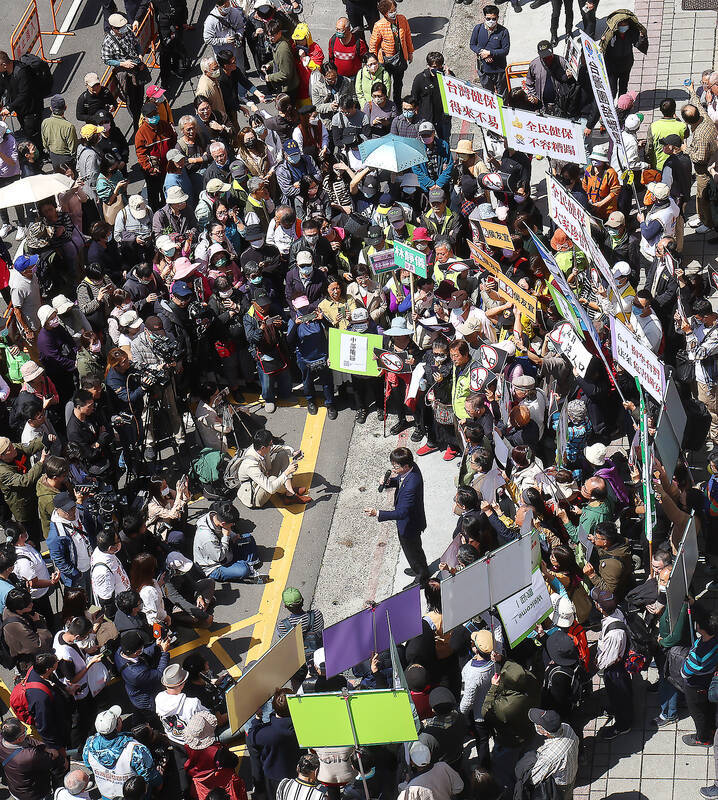Opponents and supporters of a bill that would allow Chinese spouses to obtain Taiwanese citizenship in four years instead of six staged protests near the Legislative Yuan in Taipei yesterday morning.
Those who oppose the bill proposed by the Chinese Nationalist Party (KMT) demanded that Chinese spouses be granted citizenship only after renouncing their Chinese citizenship, passing a citizenship test and pledging allegiance to Taiwan.
The demonstrators, who were protesting at a side entrance to the Legislative Yuan on Jinan Road, were mostly members of the Taiwan Association of University Professors and other organizations advocating Taiwanese independence.

Members of pro-independence groups rally at the Legislative Yuan in Taipei yesterday to protest a bill seeking to shorten the time required before a Chinese spouse may apply for Taiwanese citizenship.
Photo: CNA
Supporters of the bill, led by Taoyuan City Government consultant and New Party Deputy Secretary Yu Chi-bin (游智彬), protested across the street near an entrance to the Joint Central Government Office Building, which houses the Mainland Affairs Council.
The protests did not escalate into violence, with the two camps only trading barbs and engaging in shouting matches.
The Nationality Act (國籍法) requires foreign spouses who want to be naturalized to pass a citizenship test or participate in courses to prove they have basic Mandarin language skills, and understand the rights and obligations of a Taiwanese citizen.
The naturalization process could take four to eight years to complete, depending on the number of days they stay in Taiwan annually while applying for citizenship.
Citizenship applications from Chinese spouses are handled based on the Act Governing Relations Between the People of the Taiwan Area and the Mainland Area (兩岸人民關係條例).
Although Chinese spouses do not have to go through the same naturalization process as other foreign spouses, they need to cancel their household registration in China and secure a permanent resident certificate to stay in Taiwan before applying for a national identification card.
Whether the waiting time should be shortened from six years to four is not the issue, Taiwan Association of University Professors chairman Chen Li-fu (陳俐甫) said.
“The biggest problem is Chinese spouses need not renounce their Chinese nationality before obtaining Taiwanese citizenship. They would continue to be national security risks, even if the time for them to obtain citizenship is extended from six years to eight or 10 years,” Chen said.
Beijing’s attitude toward Taiwan is very different from decades ago when the cross-strait relations act was promulgated, Chen said.
“They [the Chinese] are constantly holding military drills and have fired missiles into our territorial waters, and now we want to shorten the time Chinese spouses need to wait to apply for citizenship,” Chen said.
That Chinese spouses are exempt from taking a citizenship test like other foreign spouses is “ridiculous,” he said.
“The purpose of administering a citizenship test is to see if they have a fundamental understanding of Taiwan’s Constitution and laws, and if they can accept a democratic way of life. This is the only way we can ascertain if they truly want to be Taiwanese,” he said.
“They cannot say that they want to live in Taiwan, have their household registration here, use the National Health Insurance system and vote in presidential elections, while at the same time continuing to be Chinese citizens. This is just wrong,” Chen said.
It is only normal for countries to restrict immigration from certain countries, particularly those led by hostile regimes, he said.
“We are not saying that all Chinese spouses are enemies, but it is a fact they have Chinese nationality,” he added.
As Taiwan and China do not have reciprocal diplomatic missions, Chen said he supports a proposal to have Chinese spouses pledge their allegiance to Taiwan at a ceremony administered by the courts, which is legally binding.
Yu said that marriage between Taiwanese and Chinese is crucial in maintaining cross-strait peace and communication.
Chinese spouses are indispensable to Taiwan’s economic development, he added.
The Democratic Progressive Party (DPP) and its supporters slander Chinese spouses and cross-strait marriages and families, which is the worst political maneuver, Yu said.
DPP Legislator Huang Jie (黃捷) on Monday introduced a draft amendment that would require Chinese spouses to swear an oath of loyalty to Taiwan and take a civic knowledge test before becoming citizens.
“There are advantages and disadvantages to treating all foreign spouses equally. We need to have a comprehensive evaluation of the pros and cons and supporting measures,” Mainland Affairs Council Minister Chiu Tai-san (邱太三) told reporters yesterday when asked about the bill.
Minister of the Interior Lin You-chang (林右昌) said that the Nationality Act would have to be amended if foreign spouses are required to swear an oath of loyalty.
“I believe that people would agree that such a requirement for foreign spouses is necessary before they become Taiwanese citizens,” Lin said.
Source: Taipei Times - 2024/03/13




















